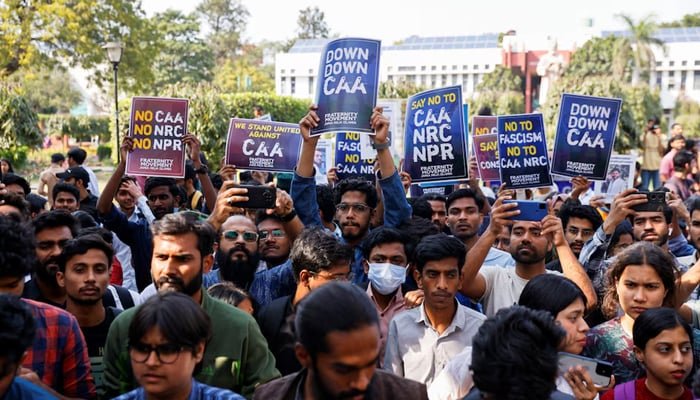In a significant wave of civil unrest Take Action for India. India has been engulfed by protests against a controversial citizenship law. Perceived by many as ‘anti-Muslim’. This legislation has sparked widespread concern and mobilized thousands across the nation. Marking a critical juncture in India’s democratic journey. As we delve into the essence of these protests, the motivations behind them. And their broader implications for society and governance. It becomes evident that this moment is more than just a response to a single law. It’s a reflection of deeper issues related to identity, equality, and the fabric of Indian democracy.
The Genesis of Dissent
Initially, the protests emerged as a direct response to the Citizenship Amendment Act (CAA). Which offers a pathway to citizenship for non-Muslim refugees from neighboring countries. Critics argue that by excluding Muslims, the law undermines the secular principles enshrined in India’s constitution.
Moreover, this legislation has been seen as part of a broader pattern of policies. That marginalize Muslim communities, fueling fears of disenfranchisement and discrimination. Take Action for India .Consequently, the CAA has acted as a catalyst. Galvanizing a diverse coalition of citizens united in their demand for inclusivity and justice.
The Tapestry of Protesters
Furthermore, the protests against the CAA have drawn participants from a wide array of backgrounds. Transcending religion, age, and social status. Students, activists, academics, and ordinary citizens have come together, showcasing the strength of India’s civil society.
Additionally, these demonstrations have been marked by creativity and resilience, with protesters employing art, poetry, and peaceful assembly.
To express their dissent. This broad-based participation underscores the depth of concern regarding the law’s implications and the collective yearning for a society Take Action for India. That upholds the dignity and rights of all its members.
Navigating the Challenges TO Take Action for India
Instances of violence, restrictions on assembly, and internet shutdowns have tested the resolve of demonstrators. And raised questions about the state’s commitment to democratic norms. Furthermore, the government’s stance on the CAA has sparked a debate about nationalism, identity. And the meaning of citizenship Take Action for India. Navigating these challenges requires a delicate balance between maintaining public order. And respecting the right to dissent, highlighting the ongoing struggle to define the contours of democracy in India.
The Broader Implications
Additionally, the protests against the CAA hold broader implications for Indian society and the global community. They serve as a reminder of the importance of vigilance in safeguarding democratic values and human rights. Moreover, this moment has the potential to shape the future of India’s political landscape.
Influencing policy, public discourse, and the relationship between the state and its citizens. Take Action for India . Internationally, the response to these protests offers insights into the dynamics of democracy, nationalism. And human rights in the 21st century, underscoring the interconnectedness of global struggles for justice and equality.
In conclusion, the protests against India’s ‘anti-Muslim’ citizenship law represent a pivotal moment of collective action and dissent. As India navigates the complexities of this unrest, the path forward will undoubtedly require dialogue, empathy. And a recommitment to the principles of inclusivity and equality. By addressing the underlying issues that have fueled these demonstrations. India has the opportunity to reinforce its democratic foundations and emerge as a stronger, more unified nation.
Read More Articles here. Inspired By Al-Jazeera News.
